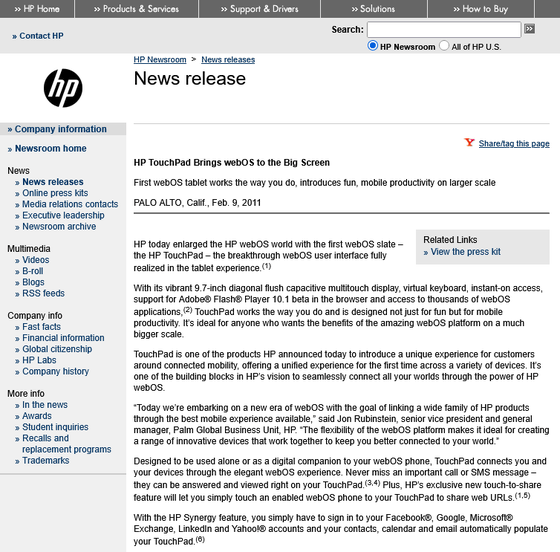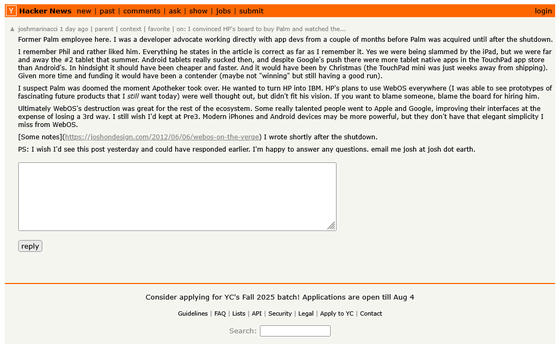The CTO who persuaded HP's board to buy Palm for $1.2 billion and then watched the business fail in just 49 days

Phil McKinney, the chief technology officer at the time who got the board of directors to approve HP's acquisition of Palm in 2010, has revealed some previously undisclosed details about why HP acquired Palm and why it decided to immediately withdraw from the company after releasing Palm's WebOS devices.
I Convinced HP's Board to Buy Palm for $1.2B. Then I Watched Them Kill It in 49 Days

In 2010, HP was a PC manufacturer trying to keep up with the shift to mobile. After spending weeks with Palm's engineering team, HP's CTO, McKinney, became convinced that Palm's WebOS was not just a mobile OS, but a 'groundbreaking platform technology that would differentiate HP in the mobile computing market.'
At this time, McKinney presented HP CEO Mark Hurd and the board of directors with the idea that 'instead of acquiring a struggling telephone company, we are strategically entering the computing platform of the future,' and closed the $1.2 billion acquisition deal. After the acquisition was completed, McKinney supported the Palm team in making good use of HP's vast resources while working with Palm's management to develop an integration plan to create strategic synergies.
McKinney, who had high hopes for WebOS, said he was thinking about how to expand WebOS to tablets as well as smartphones, integrate it with HP's PC platform, and even make apps available in the printer ecosystem.
However, in August 2010, CEO Mark Hurd was forced to resign and Leo Apotheker from German software company SAP was brought in as the new CEO, and the situation began to change.
Léo Apotheker | HP - United States

Apotheker brought a completely different strategic vision to HP: 'Transform HP from a hardware company to a software and services company.' For Apotheker, who wanted to withdraw from or minimize hardware businesses such as PCs and printers, WebOS, which would lead to the expansion of mobile devices, was an obstacle.
To make matters worse, in June 2011, McKinney required emergency surgery and ended up in hospital for eight weeks.
'I was expecting the culmination of all the engineering work and strategic planning, but instead I witnessed the fastest fall in the history of technology,' McKinney said. Watching from his hospital bed as HP launched the TouchPad tablet on July 1, 2011, McKinney said, 'I was expecting the culmination of all the engineering work and strategic planning, but instead I witnessed the fastest fall in the history of technology.'
Below is the press release from when TouchPad was announced.
HP TouchPad Brings webOS to the Big Screen

The TouchPad was a tablet competitor to the iPad, but while the iPad sold 9 million units in the quarter, TouchPad shipped just 270,000 units and sold just 25,000 units.
On August 18, 2011, just 49 days after its release, HP stopped selling all devices with WebOS. McKinney had to watch from his hospital bed as WebOS, which had been the driving force behind HP's mobile strategy, was dismantled. Apotheker did not contact the Palm team when he decided to cut WebOS.
When McKinney somehow returned to the company, he was surrounded by engineers who told him, 'You'll never be able to take a vacation again,' and 'The CEO and the board need adult supervision.' He felt that it was all his fault and explained, 'That's not true.' 'Why did Apotheker, who was the CEO of SAP, a much smaller company, end up being the CEO of HP, a giant corporation?' he said.
When McKinney left HP, the company offered him a large severance package, but he declined, saying that if he accepted it, 'there would be less things I could talk about during my time there.'
By the way, regarding this case, former Palm employee Josh Marinacci testified on Hacker News that 'everything he says in the article is correct.'
Former Palm employee here. I was a developer advocate working directly with app ... | Hacker News

According to Marinacci, at the time, the TouchPad was indeed a close second to the iPad, but other Android tablets were no good no matter how hard Google tried, and the TouchPad mini was only a few weeks away from shipping, so if Google had had more time and money, it could have been a real iPad competitor.
'Apotheker wanted to turn HP into IBM,' Marinacci said. 'HP's plan to use WebOS everywhere was well thought out, but it just didn't fit Apotheker's vision. If you want to blame anyone, blame the board for hiring him.'
Related Posts:







